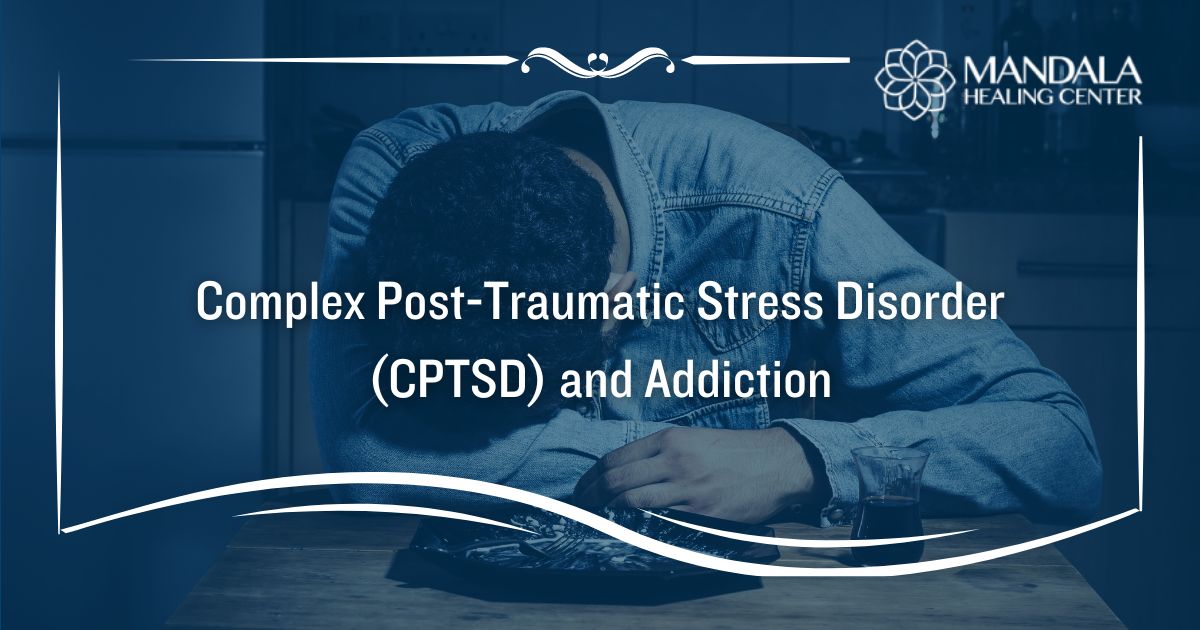Complex Post-Traumatic Stress Disorder (CPTSD) is a condition caused by prolonged exposure to traumatic events or environments. CPTSD often occurs alongside substance use disorder (SUDs), making it harder to diagnose and treat due to the psychological effects.
What Is Complex Post-Traumatic Stress Disorder (CPTSD)?
CPTSD is a psychological condition that develops after experiencing prolonged or repeated traumatic events. CPTSD is similar to PTSD (Post-Traumatic Stress Disorder) but also includes a broader range of symptoms, including difficulties with emotional regulation, self-esteem, and forming healthy relationships.
Complex PTSD is typically seen in individuals who have experienced prolonged exposure to traumatic experiences, such as:
- Childhood abuse or neglect
- Childhood exploitation
- Domestic violence
- Imprisonment
- Extended periods of war
- Sexual abuse and sex trafficking
What is Post-Traumatic Stress Disorder (PTSD)?
Post-Traumatic Stress Disorder (PTSD) is a mental health condition that can develop after experiencing or witnessing a single traumatic event. It is characterized by symptoms such as intrusive memories, nightmares, flashbacks, negative changes in mood and thoughts, and heightened reactivity.
Difference Between CPTSD and PTSD
CPTSD is a form of PTSD. While both conditions can significantly impact an individual’s daily functioning, relationships, and overall quality of life, the two have key differences. Unlike traditional PTSD, which focuses on single, isolated traumatic events, CPTSD stems from prolonged, repeated trauma or ongoing exposure to violence and is associated with a wider range of symptoms.
Symptoms of Complex PTSD
Similar to symptoms of PTSD, symptoms of CPTSD can have far-reaching effects on an individual’s life, impacting their mental and physical health, relationships, and overall well-being.
Common symptoms of CPTSD include:
Emotional dysregulation
Intense and fluctuating emotions, including sadness, anger, shame, and guilt, paired with difficulty controlling or regulating them.
Poor self-image
Low self-esteem, feelings of worthlessness, shame, and self-blame.
Trouble forming relationships
Difficulty establishing and maintaining healthy relationships, including issues with trust, intimacy, and forming secure attachments.
Avoidance and detachment
Disassociation of reminders of the traumatic events, as well as emotional detachment or numbness.
Hyperarousal
Prolonged feelings of anxiety, irritability, or anger, along with a heightened arousal response.
Intrusive thoughts
Memories, flashbacks, or nightmares related to the traumatic events.
Loss of Meanings
Feelings of hopelessness or a lack of purpose.
Physical Symptoms
Symptoms such as headaches, gastrointestinal issues, or chronic pain are associated with psychological distress.
The Link Between Complex PTSD and Addiction
The relationship between complex PTSD and addiction is complex. People with Complex PTSD often struggle with addiction, as prolonged trauma contributes to both substance abuse and addictive behaviors.
Self-Medication and Coping Mechanisms
Complex PTSD and substance abuse are often characterized by the use of drugs or alcohol as a coping mechanism to deal with emotional pain, manage symptoms, or avoid traumatic memories.
For many, using alcohol or drugs offers a temporary reprieve from the pain of trauma, providing a sense of relief and control. However, relying on these substances can worsen CPTSD symptoms over time and lead to long-term effects such as a cycle of dependence that is difficult to break.
How to Treat Complex PTSD and Addiction
Understanding the connection between trauma and addiction is crucial in providing effective treatment and support for individuals struggling with co-occurring disorders.
Breaking free from the cycle of complex PTSD and substance abuse is a challenging yet rewarding journey. By developing a comprehensive treatment plan tailored to each individual, one can address both the underlying trauma and substance use disorders to facilitate a healthy and long-lasting recovery. Comprehensive treatment plans for complex PTSD and addiction typically include:
Evidence-based therapy
Specialized therapy, such as trauma-focused cognitive-behavioral therapy (CBT) or Eye Movement Desensitization and Reprocessing (EMDR), addresses the underlying trauma associated with CPTSD.
Medication-assisted treatment
Medications, such as antidepressants or anti-anxiety medications, may help alleviate symptoms of CPTSD and support recovery from addiction.
Support groups
Participation in support groups, such as 12-step programs or trauma-specific support groups, provides peer support, validation, and encouragement throughout the recovery process.
Dual-diagnosis treatment
Dual-diagnosis treatment programs recognize the co-occurrence of complex PTSD and addiction and tailor treatment to address the individual needs of those living with CPTSD and addiction or other mental health disorders.
Holistic therapies
Holistic therapy such as yoga, meditation, acupuncture, and nutrition counseling work alongside traditional treatments by addressing the physical, emotional, and spiritual aspects of recovery for individuals with CPTSD and addiction to cultivate a balanced life.
Aftercare
Developing personalized prevention plans that address triggers, coping strategies, healthy lifestyle changes, and ongoing support systems helps individuals maintain sobriety and manage symptoms of CPTSD throughout their recovery.
Get Help for Complex PTSD and Addiction at Mandala Healing Center
At Mandala Healing Center, we know that living with co-occurring disorders like complex PTSD and addiction is a long and challenging journey that should not be taken alone. Our dedicated team prioritizes healing through compassionate care in a safe, relaxing environment where patients can begin to recover.
We guide clients through a comprehensive healing journey, combining evidence-based practices, holistic therapies, and expert medical support to help break the cycle of addiction. With the help of our team, patients will get to the root cause of their trauma and addiction, learn how to identify triggers, develop healthy coping mechanisms, and build a support network to take with them on their recovery.
If you or someone you know is struggling with complex PTSD and addiction and wants to explore treatment options, we are here to help. Contact us today to learn more.












